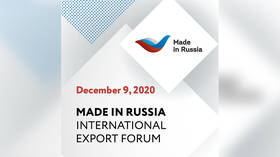‘Made in Russia’: International Export Forum discusses support measures and prospects of non-resource-based exports

On December 9, Moscow hosted the annual ‘Made in Russia’ International Export Forum. At the plenary session, the panelists looked at the trends in the export of Russia’s products during the pandemic.
The participants also presented brand new instruments and mechanisms to support Russian exporters.
On December 9, Moscow held the annual 'Made in Russia’ International Export Forum, organized by the Russian Export Center (REC). Over the years, the forum has become the go-to platform for Russian businesses wishing to bring their products to foreign markets.
The goal of this year’s forum was to address the ‘challenges of the new decade’. The highlight of the event was the plenary session which featured Russia’s Prime Minister Mikhail Mishustin, First Deputy Prime Minister Andrei Belousov, Minister of Finance Anton Siluanov, Minister of Economic Development Maksim Reshetnikov, Minister of Industry and Trade Denis Manturov, and Russian Export Center CEO Veronika Nikishina.
The panelists reviewed key trends in Russia’s non-resource-based exports during the ongoing pandemic and presented new solutions for promoting Russian products to foreign markets.
“We make products that can and must have global presence. Some of them are made exclusively in Russia and have no competition at all. The government is committed to increasing the share of Russian goods in global trade,” said Mikhail Mishustin.
According to him, in the first nine months of 2020, Russia’s non-resource-based non-energy export exceeded $111 billion, while Andrey Belousov pointed out that, by the end of the year, it will reach $145 billion.
Russian ministers also spoke about boosting non-resource-based exports as a key part of the International Cooperation and Exports national project. The goal, as outlined by Russian President Vladimir Putin, is to increase non-energy exports by at least 70% by 2030, as compared to 2020.
Andrey Belousov estimates that by 2024, Russia’s c export should reach $180 billion. The Deputy Prime Minister also stressed the need to have more companies that sell goods to foreign markets.
“At this point, our non-recourse-based non-energy export rests on about 7,000 big companies. By 2024, we need to have 10,000-10,500 companies of that scale,” said Belousov.
According to Mikhail Mishustin, the comprehensive digital ‘one-stop shop’ platform will prove to be one of the main tools to help exporters. The system, developed by REC experts, is aimed at improving coordination between relevant government agencies. It will also make the most needed services available online.
“It’s very important that this system will provide businesses with a one-stop shop access to the administrative services required for exporting activities. Exporters can now apply online for VAT exemption, for participation in exhibitions and trade shows, for free sale certification which confirms that the product complies with the Russian industry and trade standards,” said the Prime Minister.
He reiterated that the one-stop shop workflow being implemented now will mark the first milestone towards developing a fully electronic document processing system for exporters that will ultimately optimize both processing times and required efforts.
Russian Export Center will continue to develop new online products aimed at helping Russian exporters increase their presence in the global market.
REC General Director Veronika Nikishina said that, currently, state support for Russian exporters is carried out by multiple federal and regional bodies, as well as special ‘development institutes’, each with different rules and regulations. Nikishina believes that digitization could streamline the process and optimize interaction between businesses and regulators.
“The idea of creating a one-stop shop service for exporters was inspired by the ‘Multifunctional Public Services Centers’, a system that helps citizens apply for and receive state-regulated services. Adopting the same approach for businesses is the next step. This year, we have developed an e-platform for the most time- and paper-consuming services such as the VAT exemption application. We plan to move more services online next year. Business circles are particularly looking forward to getting access to electronic trading platforms,” Nikishina continued.
During the plenary session, the participants also discussed Regional Export Standard 2.0 that 40 Russian regions will implement in 2021. Mikhail Mishustin pointed out that this tool helps develop strategies for the export infrastructure of each region. It also provides guidance for training management teams, working with the business community, developing e-commerce, etc.
The Prime Minister mentioned that it is very important for the government to create export support systems in Russian regions. These projects must focus on helping small and medium-sized enterprises
“Today, we have regional Export Support Centers operating in 82 regions. Their main objective is to provide assistance to small and medium-sized businesses that are ready to bring their products and services to international markets. Obviously, such companies need support. The government should help them get necessary training, so they can learn the basics of the export business, direct them to the right markets and international partners, and facilitate the process of the export contract execution,” said Mikhail Mishustin.
Veronica Nikishina added that a new product line for export support centers would be launched next year.
She said, “The idea is to replace miscellaneous services with nine packages. For example, during every business mission, we can also look for potential customers and prepare presentations. We are optimizing the services that are already offered at export support centers. This will make our work more efficient.”












